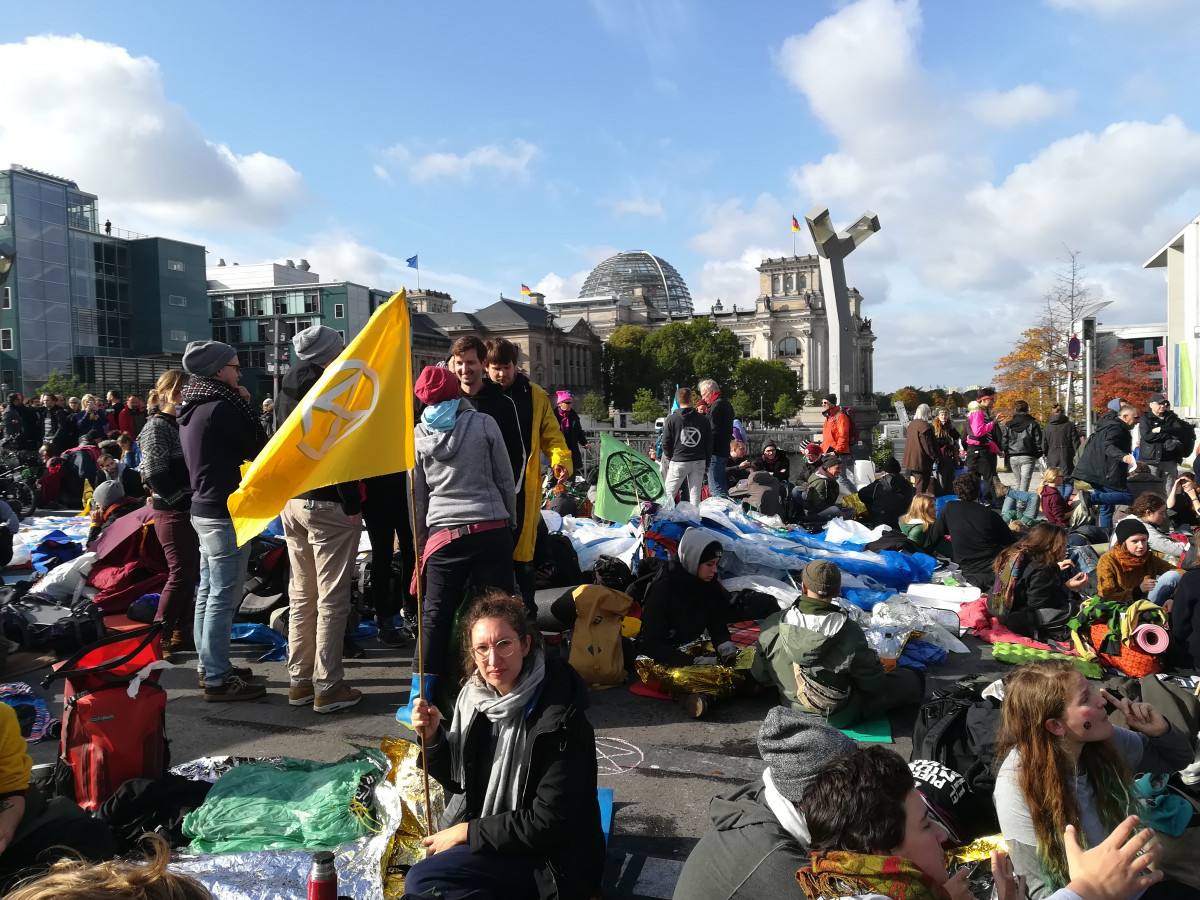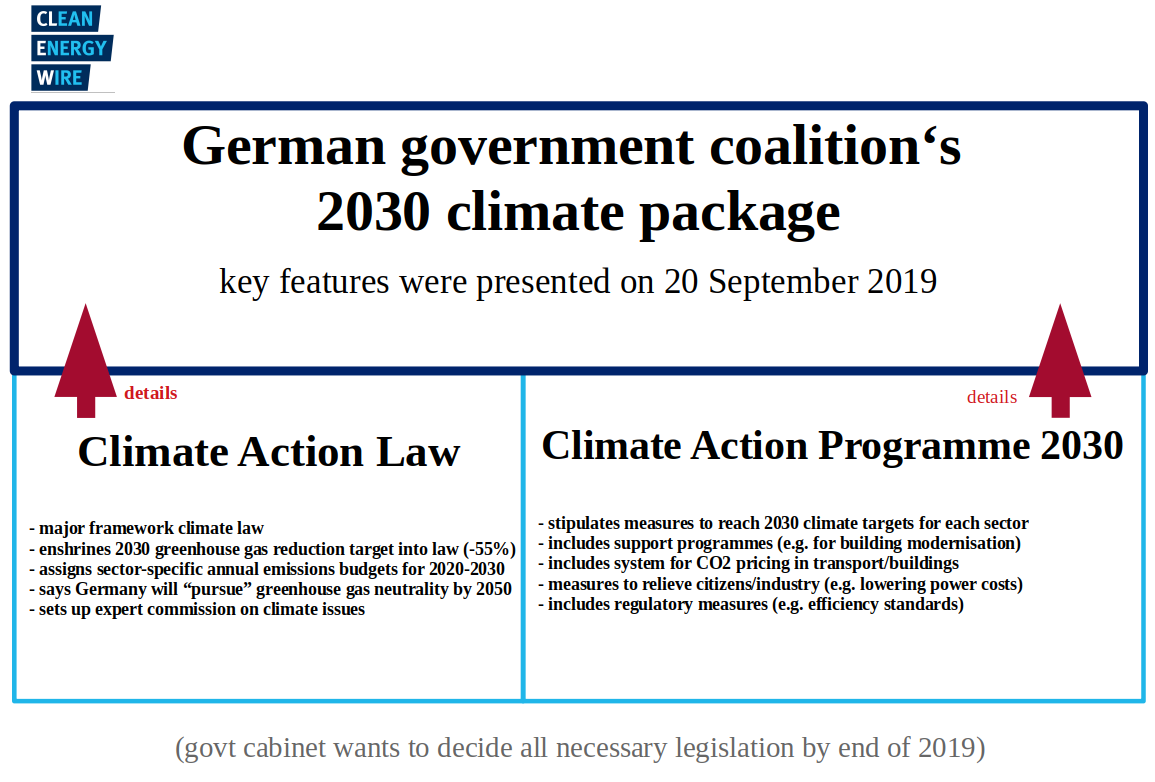German govt adopts major climate law, set of measures to meet 2030 targets
Chancellor Angela Merkel’s government cabinet has adopted Germany’s first Climate Action Law and a detailed programme of measures to reach 2030 climate targets in all sectors of the economy. With today’s decisions, the coalition of Merkel’s Conservatives (CDU/CSU) and the Social Democrats (SPD) fleshed out the general package it presented with a long-anticipated decision on 20 September. The measures now have to be translated into legislation and decided by the federal parliament over the coming months and well into next year.
“Today is an important day for climate action in Germany,” said environment minister Svenja Schulze at a press conference in Berlin. “However, it does not mark a final point, it’s a new beginning. I will only be satisfied when the greenhouse gas emissions actually go down sufficiently.”
Economy minister Peter Altmaier called today's decisions "a central step towards reaching our climate targets without damaging the competitiveness of our industry." He said while the energy sector and industry were well on track, buildings and transport still had some catching up to do.
The coalition’s climate package now consists of (A) the framework Climate Action Law, which enshrines the 2030 greenhouse gas emissions target into law, assigns sector-specific annual emissions budgets and says Germany will “pursue” greenhouse gas neutrality by 2050. [Find a factsheet here.]
And (B) the Climate Action Programme 2030, which sets out measures to reach 2030 climate targets in each sector, such as a CO2 price for transport and buildings, a slew of incentives and regulatory actions such as efficiency standards. Schulze called the programme “the binding to-do list which describes in detail what the cabinet will get on its way over the coming weeks”.
The government adopted the two climate policy pieces as hundreds of protester from the Extinction Rebellion movement blocked key streets in the political centre of Germany’s capital Berlin, with many activists gathering in front of Merkel’s chancellery.
Stefan Kapferer, head of utility association BDEW, called the plans “not thought through and not coherent with the objectives of the energy transition”, while environmental NGOs said Germany would miss its targets with the proposed measures.
After a prolonged boom in renewable energy, Germany's planned transition to a low-carbon, nuclear-free economy – the famed Energiewende – has slowed in recent years. The country is set to miss key national energy transition targets in 2020 – among them reducing greenhouse gas emissions by 40 percent – and the governing parties CDU/CSU and SPD have now put their focus on reaching the 2030 goals. Merkel set up the so-called climate cabinet – a group of ministers with responsibilities in key climate policy fields – earlier this year to decide necessary legislation. The group presented a general strategy on 20 September, and the government must now mould the details presented today into legislation and regulations.
Legislative process has only just begun
With today’s announcements, the legislative process is far from over. The government aims to decide all necessary legislation by the end of 2019 - but implementing the whole package will be a “major legislative task”, said the German Energy Agency (dena) recently. Federal parliament (Bundestag) will now get to work on the framework Climate Action Law, as well as the packages of legislation the cabinet adopts throughout the rest of the year – which could lead to changes.
Spiegel Online reported that the “clock is ticking for the government”, as anything that is supposed to come into force at the beginning of 2020 must be adopted by the cabinet in October to allow for enough time for parliament debate.
Many measures also need to be approved by the council of state governments (Bundesrat). The Green Party – which forms part of a majority of state government coalitions – has said it will try to amend at least some of the legislation. The process on many of the measures will therefore drag well into 2020.
Climate Action Law includes net-zero target 2050
Schulze called the climate law “progress and an answer to past shortcomings”. It holds ministries accountable for reaching targets in their areas of responsibility, and thus “fundamentally improves cooperation within the government cabinet.”
Some had criticised that, contrary to earlier drafts, the government no longer said net-zero emissions by 2050 “shall be reached”, instead calling to “pursue” the goal. Schulze defended the new wording: “It’s in no way weakened. We have updated it, because at the Climate Action Summit in New York we committed to doing it, as well as on the European level, and that’s now in the text. So it’s a tad more binding than before,” she told public broadcaster ZDF.
“We will be greenhouse gas neutral by 2050,” said Schulze at today’s press conference. Including the goal also creates planning stability for Germany’s economy, she added. “Now it's perfectly clear: all sectors are well advised to prepare in time for the post-fossil age.”
In a last-minute change, the government included a paragraph in the Climate Action Law which stipulates that Germany will assign annual emissions budgets for the years after 2030 by 2025. This was necessary, as the Paris Agreement calls on countries to regularly raise ambitions, and European Commission President-elect Ursula von der Leyen has announced she aims to raise EU climate targets. “Of course, Germany will also do more then,” said Schulze.
Renewables expansion targets unattainable with proposed programme – BDEW head
BDEW head Stefan Kapferer said that the government’s aim to raise the share of renewables in power consumption to 65 percent by 2030 is “hardly attainable” with the climate action programme proposals.
The renewables expansion targets for onshore wind and solar PV have changed slightly compared to early drafts of the climate action programme. The targeted installed capacity of solar was raised to 98 gigawatt (GW) by 2030 (from an earlier draft’s 85 GW), and the target for onshore wind lowered to 67-71 GW (from 80 GW).
However, particularly onshore wind expansion grapples with issues such as hurdles in planning and approval procedures, also due to acceptance issues among the population. The programme therefore stipulates a minimum distance rule for onshore wind turbines to the nearest settlement of 1,000 metres.
Renewables association BEE’s president Simone Peter said: “With the Climate Action Programme 2030, the federal government de facto says goodbye to the 2030 renewables expansion target.”
However, solar energy association BSW Solar welcomed plans to raise expansion targets for the sector as a “step in the right direction”, which needed to be followed up by the relevant legislation.
“Instead of getting rid of hurdles, the expansion of wind energy is made more difficult with blanket minimum distances,” said BDEW's Kapferer. He also criticised the “timid” entry-level price for CO2 emissions in transport and buildings and the “insufficient” decrease of power prices. Arguing it would prevent an overburdening of the population, the government had decided a slow-starting CO2 price with a low entry-level of 10 euros per tonne in 2021.
NGOs criticise package
Environmental NGO Greenpeace said Germany will not reach its 2030 target with today’s decision. “The government's package again postpones overdue CO2 reductions by years. This means that neither the gap in the 2020 climate protection target will be quickly closed, nor will the target for 2030 be reached,” said the organisation’s Andree Böhlin. “The implementation of the Paris Climate Agreement and the 1.5° C target are thus completely out of sight for the government.”
WWF Germany’s head of nature conservation, Christoph Heinrich, welcomed that the country would “finally get a legislative framework to make climate action binding in all policy fields”. However, the attached programme of measures was not enough to reach mid- and long-term targets, he added. “The gap between what’s necessary from a scientific perspective and what the federal government has put on the table cannot be bridged by this package.”



